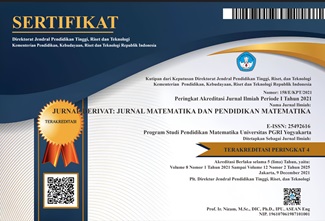Analisis Model Kooperatif Dalam Pembelajaran Blended Learning Statistika: (STAD dan Jigsaw)
DOI:
https://doi.org/10.31316/j.derivat.v9i1.2021Abstract
This research is an experimental study that aims to determine the difference in learning outcomes between students who are taught using the STAD cooperative learning model and those who are taught using the Jigsaw cooperative learning model. The population in this study was all students in class XI SMK Negeri 2 Jayapura for the academic year 2021–2022, totaling 111 people. The sample was taken using a purposive sampling technique, totaling 51 people, consisting of two classes, namely class XI, Office 3, and Class XI, Office 4. Class XI Office 3 (experimental class) is a class that is taught using the STAD cooperative learning model, and Class XI Office 4 (control class) is a class that is taught using the Jigsaw cooperative learning model. The obtained data were then analyzed using parametric statistics via a t-test. The results showed that: 1) there was no significant difference in mathematics learning outcomes between students taught by the STAD type of cooperative learning model and students who were taught by the Jigsaw type of cooperative learning model; 2) the mean of mathematics learning outcomes of students who are taught the STAD type of cooperative learning model is lower than that of students who are taught the JIGSAW type of cooperative learning model, which is 62.61 smaller than 70.43.
Keywords: Cooperative model, Blended learning, Statistics
References
Dewayani, M., & Susman, Y. (2020). Blended Learning Kegiatan Kajian dan Praktik Lapangan Mahasiswa di SMK. Belantika Pendidikan, 3(2), 43–47. https://doi.org/10.47213/bp.v3i2.86
Divayana, D. G. H. (2017). Evaluasi pelaksanaan blended learning di SMK TI Udayana menggunakan model CSE-UCLA. Jurnal Pendidikan Vokasi, 7(1), 64. https://doi.org/10.21831/jpv.v7i1.12687
Hermawan, C. M., Rosfiani, O., Suheti, & Susanti, S. F. (2020). Stad type cooperative learning model: An action in learning mathematics. International Journal of Scientific and Technology Research, 9(4).
Malik, A., & Chusni, M. M. (2018). Pengantar Statistika Pendidikan. International Journal of Physiology, 6(1).
Michael, A. (2004). Statistics and research methodolgy. In Get Through MRCPsych Parts 1 and 2: 1001 EMIQs (pp. 285–300). CRC Press. https://doi.org/10.1201/b13261-21
Mufarrikoh Z. (2019). Statistika pendidikan (konsep sampling dan uji hipotesis. CV Jakad Media Publishing.
Murtiyasa, B., & Hapsari, S. N. (2020). The Effect of TAI and STAD Strategy towards Learning Outcomes Reviewed from Mathematical Communication Skill. Universal Journal of Educational Research, 8(6), 2406–2415. https://doi.org/10.13189/ujer.2020.080625
Oliveira, B. R. M., Vailati, A. L., Luiz, E., Böll, F. G., & Mendes, S. R. (2019). Jigsaw: Using Cooperative Learning in Teaching Organic Functions. Journal of Chemical Education, 96(7), 1515–1518. https://doi.org/10.1021/acs.jchemed.8b00765
Sakillah, K., Hemafitria, H., & Rianto, H. (2020). PENGARUH PENGGUNAAN MODEL BLENDED LEARNING TERHADAP HASIL BELAJAR SISWA KELAS X TKR SMK PUTRA KHATULISTIWA PONTIANAK. Jurnal Pendidikan Kewarganegaraan, 4(2), 116. https://doi.org/10.31571/pkn.v4i2.2108
Sugiyadnya, I. K. J., Wiarta, I. W., & Putra, I. K. A. (2019). Pengaruh Model Pembelajaran Kooperatif Learning Tipe NHT terhadap Pengetahuan Matematika. International Journal of Elementary Education, 3(4), 413. https://doi.org/10.23887/ijee.v3i4.21314
Triani, D. A. (2016). IMPLEMENTASI STRATEGI PEMBELAJARAN KOOPERATIF (COOPERATIVE LEARNING) TIPE JIGSAW DI PERGURUAN TINGGI. UNIVERSUM, 10(2). https://doi.org/10.30762/universum.v10i2.262
Ugwu, E. O. (2019). Effect of Student Teams Achievement Division and Think-Pair-Share on Students’ Achievement in Reading Comprehension. African Journal of Teacher Education, 8, 218–237. https://doi.org/10.21083/ajote.v8i0.5209
Ying, Z., & Sui Pheng, L. (2014). Research Methodolgy. In Project Communication Management in Complex Environments (pp. 93–102). Springer Singapore. https://doi.org/10.1007/978-981-4560-64-1_5
Yuberti, A. saregar dan. (2017). Pengantar Metodologi Penelitian Pendidikan Matematika Dan Sains. In Pengantar Metodologi Penelitian Pendidikan Matematika Dan Sains.
Yuliani, W., & Siliwangi, I. (2019). Pengaruh Metode Kooperatif Learning Tipe Jigsaw Terhadap Kemandirian Belajar Peserta Didik Kelas VI SDN Tunas Bakti Subang Tahun Pelajaran 2018 / 2019. QUANTA, 3(2).
Yusuf, Y. Q., Natsir, Y., & Hanum, L. (2015). A Teacher’s Experience in Teaching with Student Teams-Achievement Division (STAD) Technique. International Journal of Instruction, 8(2), 99–112. https://doi.org/10.12973/iji.2015.828a
Downloads
Published
Issue
Section
Citation Check
License
Authors who publish with this journal agree to the following terms:
-
Authors retain copyright and grant the journal right of first publication with the work simultaneously licensed under a Creative Commons Attribution-ShareAlike 4.0 International License that allows others to share the work with an acknowledgment of the work's authorship and initial publication in this journal.
- Authors are able to enter into separate, additional contractual arrangements for the non-exclusive distribution of the journal's published version of the work (e.g., post it to an institutional repository or publish it in a book), with an acknowledgment of its initial publication in this journal.
- Authors are permitted and encouraged to post their work online (e.g., in institutional repositories or on their website) prior to and during the submission process, as it can lead to productive exchanges, as well as earlier and greater citation of published work (See The Effect of Open Access).







